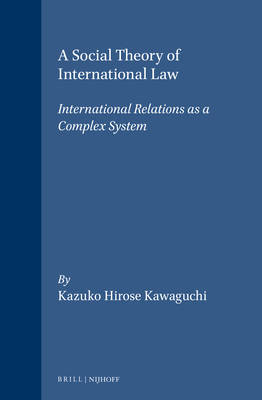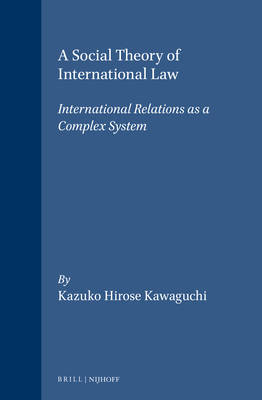
- Afhalen na 1 uur in een winkel met voorraad
- Gratis thuislevering in België vanaf € 30
- Ruim aanbod met 7 miljoen producten
- Afhalen na 1 uur in een winkel met voorraad
- Gratis thuislevering in België vanaf € 30
- Ruim aanbod met 7 miljoen producten
Zoeken
A Social Theory of International Law
International Relations as a Complex System
Kazuko Hirose Kawaguchi
€ 256,45
+ 512 punten
Uitvoering
Omschrijving
There has long been an advocacy for the sociology of international law, and yet it has never been constructed so systematically and axiomatically as in this book. Based on vital terms such as 'action' and 'system, ' this book has conducted an investigation into the 'auspices' or the fundamental international sociological conditions over which international law is built, and accordingly, into how international law can control global relations.
The significance of this work lies in its aim of showing by the application of a consistent logic, how complex observed phenomena can be explained and understood on the basis of certain shared fundamental perceptions drawn from common experience.
By asking how a state acts in a complex system that consists of at least two subsystems having different goals and different logics, two specific issues are discussed:
(1) The relationship between domestic and international law, namely, that between Article 9 of the Constitution of Japan and the UN Charter (especially the provisions for a collective security system as mentioned in chapter VII),
(2) The relationship between international law and international politics, namely, the relationship between the prohibition of the use of nuclear weapons and the logic of nuclear deterrence.
The significance of this work lies in its aim of showing by the application of a consistent logic, how complex observed phenomena can be explained and understood on the basis of certain shared fundamental perceptions drawn from common experience.
By asking how a state acts in a complex system that consists of at least two subsystems having different goals and different logics, two specific issues are discussed:
(1) The relationship between domestic and international law, namely, that between Article 9 of the Constitution of Japan and the UN Charter (especially the provisions for a collective security system as mentioned in chapter VII),
(2) The relationship between international law and international politics, namely, the relationship between the prohibition of the use of nuclear weapons and the logic of nuclear deterrence.
Specificaties
Betrokkenen
- Auteur(s):
- Uitgeverij:
Inhoud
- Aantal bladzijden:
- 340
- Taal:
- Engels
- Reeks:
- Reeksnummer:
- nr. 10
Eigenschappen
- Productcode (EAN):
- 9789041121585
- Verschijningsdatum:
- 1/01/2003
- Uitvoering:
- Hardcover
- Formaat:
- Genaaid
- Afmetingen:
- 165 mm x 244 mm
- Gewicht:
- 675 g

Alleen bij Standaard Boekhandel
+ 512 punten op je klantenkaart van Standaard Boekhandel
Beoordelingen
We publiceren alleen reviews die voldoen aan de voorwaarden voor reviews. Bekijk onze voorwaarden voor reviews.








